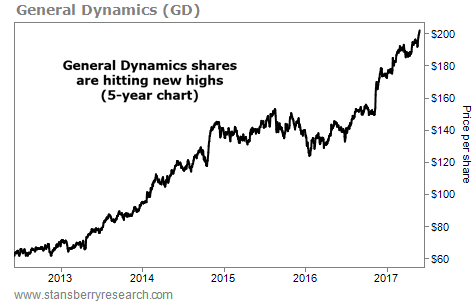| Home | About Us | Resources | Archive | Free Reports | Market Window |
Wealth Grows on Its Own... But You Must Plant the SeedsBy
Wednesday, May 31, 2017
If you don't do this, you will likely never, ever be wealthy.
You will work until your health collapses, and you'll be dependent on the whims of Washington bureaucrats. Quite possibly, you'll die broke.
It's a disturbing fate... But many Americans will experience it firsthand.
So for a moment, forget about valuing stocks, picking the fund with the lowest fees, or finding the ideal asset allocation.
All those are important. But your retirement – and wealth that you accumulate across your lifetime – depends almost entirely on just one factor...
I'm talking about your savings rate.
It doesn't matter whether you make $30,000 per year or $300,000. It's all about the percentage that you can save...
For example, if you save 10% and spend 90%, it's going to take a long time to become wealthy. But... and this is outrageous... you would actually be saving at double the 5% rate of the average American.
A 2015 report from the Government Accountability Office found that 41% of households age 55-64 have no retirement savings.
You must take personal control of your wealth... And you can start today.
Remember, saving is just spending a little less than you take in. Start small at first. But if you can save a higher-than-average amount... say, 20%, 30%, even 50%... I guarantee you will be wealthy in a modest number of years.
The best part is that it doesn't really matter how much you make. It only matters how much you save...
Assuming modest investment returns of 5%... the average American has to work for more than 65 years with a 5% savings rate before accumulating enough wealth to replace their income without touching the principal.
But you can bump that savings rate up...
If you can save 20%, you will be wealthy enough to retire after less than 40 years of work. If you save 30%, you can retire in less than 30 years. And if you can manage to save 50%, you can stop in less than 20 years.
The numbers are shocking, but clear.
No matter how skilled you are as an investor, upping your savings rate is more powerful to your wealth than either increasing your income or increasing your investment returns. That's because it's a one-two punch... you increase how much you have to invest, while decreasing how much you spend. You also learn how to live longer on less money.
Here are a few simple tricks to get you started saving more...
A recent study shows that those who have a portion of their earnings directly deposited into a savings account automatically save about $450 a month, much more than the average. Try it. Start with $50, then go to $75 in a couple of months, then to $100, and so on.
Often, your employer may match contributions that you make to your 401(k) up to a certain level. If there's one financial decision that absolutely every single person needs to make, it's this... Always contribute enough to your 401(k) to earn the maximum employer contribution. Skipping out on that free money is the most senseless mistake in personal finance. And if you ever receive a raise, put the extra money into your 401(k) up to the maximum amount ($18,000 in 2017). At my company, I make an instant 50% on the first 6% I save because the company matches. It's the best investment I make every year.
It's just as easy as opening any other brokerage account. When registering, you simply select IRA as the account type. When you file your taxes at the end of the year, the forms include a line to enter any IRA contributions. It's as simple as that. And it will save you tens of thousands of dollars over just a decade or two of retirement savings. There's also another type of IRA called a "Roth IRA." This account lets you make after-tax contributions. Then when you withdraw the income in retirement, you don't pay any taxes on it. This account makes sense for people who believe that their tax rate is lower now than it will be when they retire. I recommend folks split the difference and put half into a Roth and half into a deductible so-called "Traditional IRA."
If your income is under certain limits, you can get an even greater boost to your IRA. For 2017, a married couple earning between $40,001 and $62,000 is eligible for a tax credit equal to 10% of their IRA contribution. So if a couple puts $1,000 away, they not only lower their taxable income by $1,000, they also get another $100 of hard cash back from the IRS as a tax credit. The tax credit gets bigger at lower income levels. For a married couple making less than $37,000, the credit is 50% of their contribution. Saving is difficult for low-income folks, but this helps. It's also a great boost to the savings of young people. This is one heck of a deal. Put $2,000 into your IRA and the government will give you $1,000 (the maximum) in cash back.
Credit unions often pay the best rates on savings accounts – like money-market accounts and certificates of deposit. And they keep your money away from Wall Street. Credit unions are nonprofit companies that act as local community banks. If you're tired of being abused by your big bank, move to a credit union. Remember that ultimately, how much you save could be the difference between a lifetime of poverty... or one of wealth.
With two 401(k)s and two IRAs, a married couple interested in saving aggressively can save $46,000 a year without paying income taxes. That's tens of thousands of dollars that you get to keep, and that you can spend on whatever you'd like later in life. And by investing that money, you can compound your earnings quickly.
Before you know it, you'll have wealth and riches to enjoy in your retirement days.
Here's to our health, wealth, and a great retirement,
Dr. David Eifrig
Further Reading:
"The first step to building wealth is not to increase your income," Dave writes. "The first step is to curb your spending." Before you can put your money to work, you must first save more... But you don't need to cut back on what makes you happy. Read more here: The Rich Do Have a Secret.
"Dividends are vital to the overall returns of your portfolio," Dave explains. And you can make sure a company will likely keep paying out its dividend in the future – by focusing on one specific number. Learn more here: How This Ratio Can Dramatically Increase Your Income Every Year.
Market NotesTHE 'OFFENSE' SECTOR IS ALIVE AND WELL Today, we'll highlight the long-term success of a leading "offense" contractor...
Regular readers know that in the past, we've noted that the U.S. is always involved in military action. The companies that supply the weapons of war are called "defense contractors." But with so much government spending on foreign conflicts, we believe "offense contractors" might be a more appropriate title. And the business of war is still going strong...
For proof, we'll look at shares of General Dynamics (GD). The company's military divisions produce things like tanks, submarines, combat vehicles, and high-tech computer systems. But General Dynamics also owns popular luxury-jet company Gulfstream Aerospace – whose "G" series jets are among the most coveted in the world.
As you can see, the government is still spending plenty of money on war. Shares of General Dynamics are up nearly 45% in the past year alone – and they just hit a new all-time high. It's a bull market in offense...
 |
Recent Articles
|



